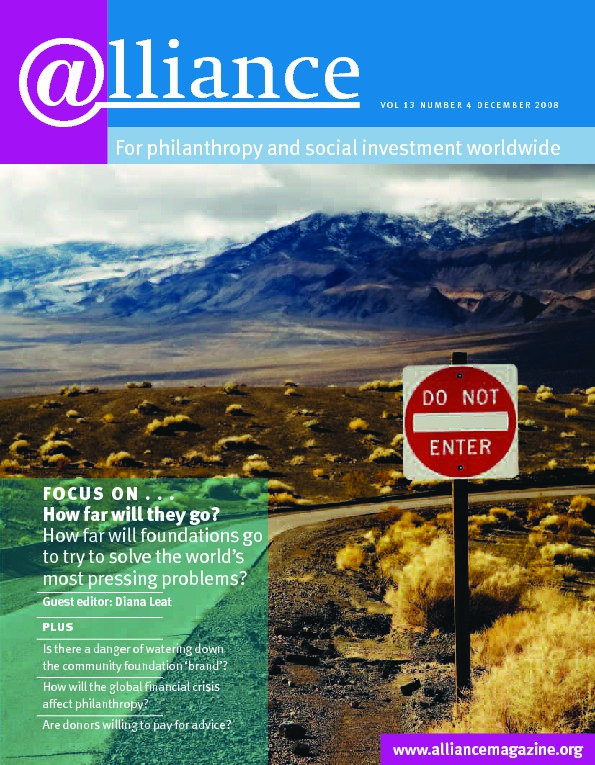 Progressive social change foundations exist to improve the lives of disadvantaged people. Many have shown great imagination, professionalism and tenacity in so doing. But now that disadvantaged people worldwide are facing threats of unprecedented scale and severity because of climate change and increasing competition for overstretched natural resources, are these same foundations losing the plot?
Progressive social change foundations exist to improve the lives of disadvantaged people. Many have shown great imagination, professionalism and tenacity in so doing. But now that disadvantaged people worldwide are facing threats of unprecedented scale and severity because of climate change and increasing competition for overstretched natural resources, are these same foundations losing the plot?
The September 2007 edition of Alliance had a special feature on ‘tackling climate change’. Guest editor Stephen Heintz of Rockefeller Brothers Fund rounded off his introductory piece with the measured words: ‘Only by abandoning the inertia of our own forms of business as usual will philanthropy … help put the earth on a trajectory towards a sustainable future.’ Ben Tuxworth of Forum for the Future was more robust: ‘What is the point of micro-managing outcomes for disadvantaged groups here and there if the universal basis for survival is threatened? Moving the deckchairs on the Titanic springs to mind.’
In December 2007, as a trustee of the Carnegie UK Trust (CUKT), I attended a briefing for major UK social change foundations on climate change. We heard that the key to avoiding the worst impacts lies not with science but with profound shifts in patterns of consumption secured through a combination of voluntary and statutory measures that social change foundations could help to facilitate.
That wake-up call and the concerns being expressed by grassroots organizations involved in CUKT’s existing programmes prompted trustees to examine what more we could do in respect of climate change. With help from the Association of Charitable Foundations, we initiated a survey of the extent to which other UK foundations were engaged with this issue. Steven Burkeman reports his findings elsewhere in this magazine (see p7). Suffice it to say here that Stephen Heintz was absolutely correct about the inertia of business as usual. Twelve months after he wrote that article, there is precious little evidence that UK foundations are rising to the challenge.
When my stint as a CUKT trustee ended in July, I was asked to set out what I thought CUKT and other similar foundations could uniquely do in relation to climate change. My starting point was a report called zerocarbonbritain, published by the Centre for Alternative Technology, which offers a strategy to reduce Britain’s carbon emissions to zero in 20 years within a framework of global social equity. A vital part of the strategy is to make ‘politically thinkable’ what science shows must be done. This in turn calls for strong leadership, a robust cross-party consensus, and ‘an urgent sense of common purpose more akin to that which pertained during World War Two than in any period since’.
I advanced the view that UK social change foundations should convene discussions between the main UK political parties aimed at achieving consensus and also take a leading role in promoting a major campaign to increase public support for the collective and individual actions needed to avert runaway climate change. It seemed reasonable to assume that, given the general disaffection with political spin, the public would have greater trust in a campaign emanating from independent charitable foundations.
I also suggested that this was an issue that would justify departure from the widely held policy that endowed foundations restrict their spending to a level that will preserve the capital value of their assets. The Stern Report demonstrated that investment now in mitigation makes sense in scientific and economic terms because much greater expenditure will otherwise be needed in future to help humanity adapt to a more hostile living environment. Surely the same principle should apply to the effective use of foundation resources.
The global financial and economic crisis has given rise to many calls for a new economic model in which a better balance is struck between economic growth, social justice and environmental sustainability. In the UK we also have new world-leading climate change legislation and a new Department for Energy and Climate Change whose Secretary of State, in his first interview, said, ‘I don’t think there is an option not to act’ and ‘Politicians cannot do this alone’.
The stage therefore appears to be set for a strategic initiative by social change foundations who have spent many years and countless millions earning the right to ‘speak truth to power’ on behalf of the disadvantaged. It would be a remarkable betrayal of their mission if they should fail to exercise that right at the highest political levels at the very moment of the disadvantaged’s greatest need.
Tony Pender was a trustee of CUKT from 2000 to 2008. Email arp@coldtown.demon.co.uk


Comments (0)